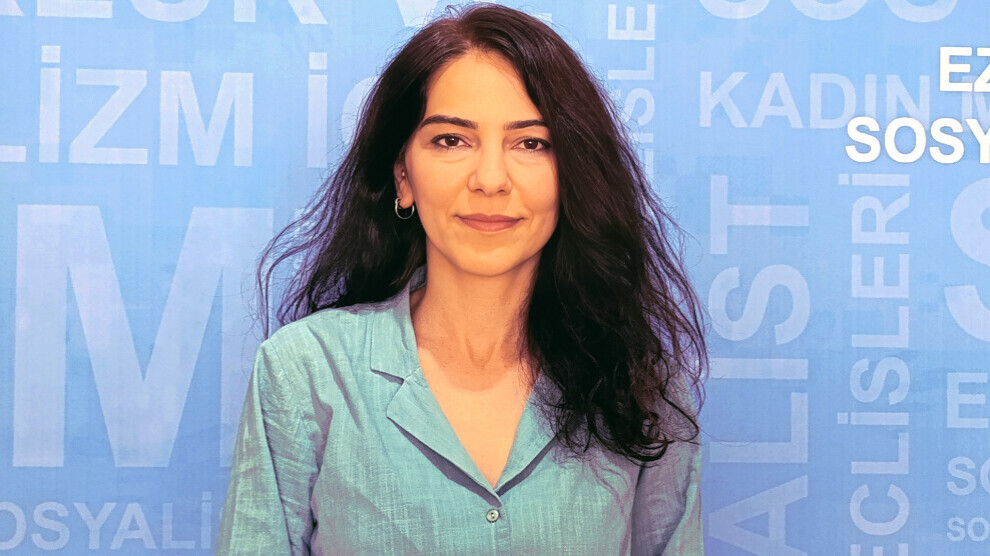Uçar: Pit-type prisons are designed to suppress society
Lawyer Sezin Uçar, co-chair of the ESP, said that pit-type prisons are designed to impose pressure on all segments of society.
Lawyer Sezin Uçar, co-chair of the ESP, said that pit-type prisons are designed to impose pressure on all segments of society.

The hunger strike launched in protest of the transfer of three members of the Socialist Party of the Oppressed (ESP) to pit-type prisons is ongoing.
Data from the Ministry of Justice shows that there are 43 S-type and Y-type prisons in Turkey. These newly constructed prisons, introduced by the government in 2023, are particularly known for their extremely high walls, which is why they are referred to as “pit-type” prisons. Some of those arrested in the operation carried out against the ESP in January were transferred to these prisons. In response, a hunger strike was launched and is currently being continued by three ESP members.
Sezin Uçar, co-chair of the ESP, told ANF that the regime has built these prisons as a means of suppressing those who take to the streets demanding justice and freedom, and those who raise their voices in protest. Uçar said: “The regime wants to deepen the system of isolation and solitary confinement in prisons in every possible way, targeting the bodies, minds, and wills of the prisoners.”
There is intense isolation
Sezin Uçar noted that the physical structure of pit-type prisons is deliberately designed to deepen isolation. She continued: “Unlike other high-security prisons, pit-type prisons impose extremely limited outdoor time. Prisoners are allowed into the yard for a maximum of two hours. They are held in single-person or three-person cells, but most are kept in solitary cells. The walls surrounding the outdoor areas are much higher than those in other prisons. Because the walls are so tall and the ventilation spaces are extremely narrow and confined, making the structure resemble a pit. That is why they are referred to as pit-type prisons.”
Preventing the revolutionary life of prisoners
These prisons are built with three floors, and each floor houses individuals prosecuted under different charges. This architectural design poses serious safety risks for the prisoners. For example, someone being tried for alleged membership in a leftist organization might be held on a floor directly above someone convicted of or being tried for membership in ISIS. This is done deliberately and with clear intent. Even those facing the same charges are placed in separate blocks. This is part of a long-standing prison policy by the state, specifically designed to disrupt the communal life of revolutionary prisoners, to prevent them from collectively creating a communal life, and to isolate them from any form of communication and dialogue with one another.
This is not an acceptable system
Lawyer Uçar pointed out that the extremely limited ventilation hours pose a serious problem, especially considering how strictly this rule is enforced for detainees. “Of course, even for those serving aggravated life sentences, these time limits are unacceptable. But it is especially troubling that individuals who are still on trial, who may ultimately be acquitted, are nonetheless subjected to such harsh conditions. Most of these detainees are transferred to pit-type prisons simply because they have had confrontations with prison administration in other facilities, often due to having disciplinary investigations opened against them.” She continued: “But what actions trigger these disciplinary measures? Refusing to accept the ‘terrorist’ label imposed by the administration, protesting something, chanting slogans, submitting petitions, or demanding basic rights. All of these, which are routine actions for a prisoner, are treated as threats. In this sense, this prison regime aims to keep a large part of society under isolation. It is a regime built on seclusion. That is why it must be opposed. From our perspective, and from the perspective of revolutionary socialists, this is absolutely not an acceptable system.”
Support must be given to our comrades’ action
Sezin Uçar reminded that members of the ESP who have been in detention for the past four months have also been transferred to pit-type prisons, and that their comrades are currently on hunger strike to protest these conditions. She said: “Our Co-Chair Deniz Aktaş, our representative from the Socialist Women's Assemblies (SKM), Tanya Kara, and many of our comrades were arrested and sent to Silivri Prison. On 8 March, numerous disciplinary investigations were launched against them, and many of our comrades were transferred to pit-type prisons. InIn responsse to this attack,, theyey llaunchedunched a a hunger strike. First, they submitted petitions
to the Ministry of Justice, requesting to be transferred to a prison near the court where their trials are being held. They rejected the pit-type prison, protested with slogans, and expressed their objection through petitions. They also protested by going on hunger strike. Some comrades ended their hunger strike after being relocated, while others have newly joined. Currently, three of our friends are continuing the hunger strike.” Uçar emphasized that this issue should be at the center of attention for all political parties, all segments of the socialist left, and all revolutionary institutions. She said, “This is not just the problem of those who have been sent to that prison. The whole society is being targeted for imprisonment in this form. Society as a whole is being forced to endure an intensified form of isolation. That is why we are calling on everyone to support our comrades’ hunger strike, and also to actively participate in the struggle to shut down pit-type prisons.”